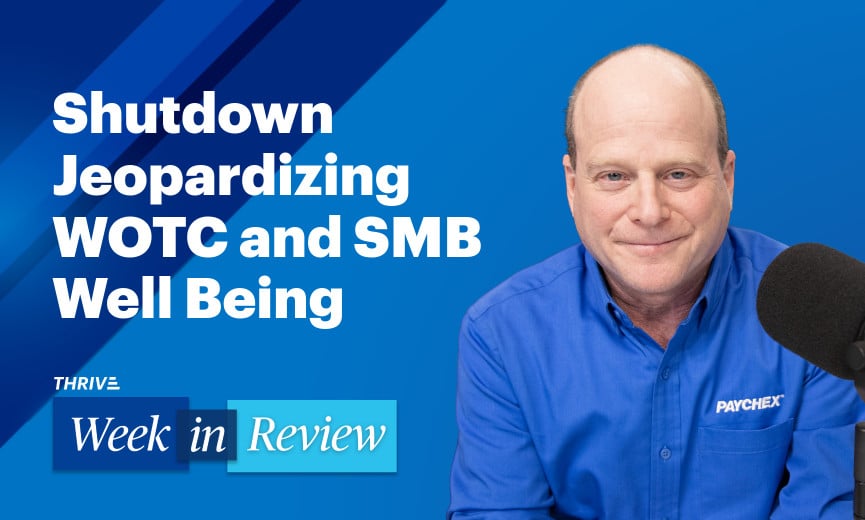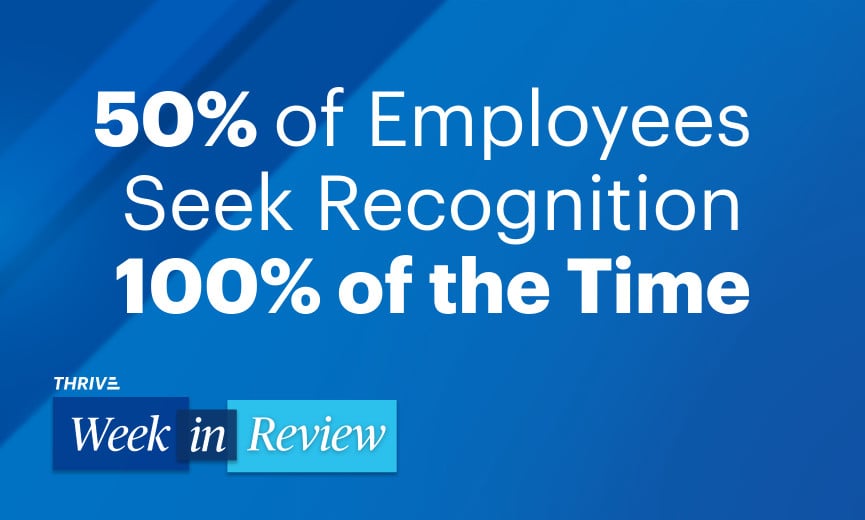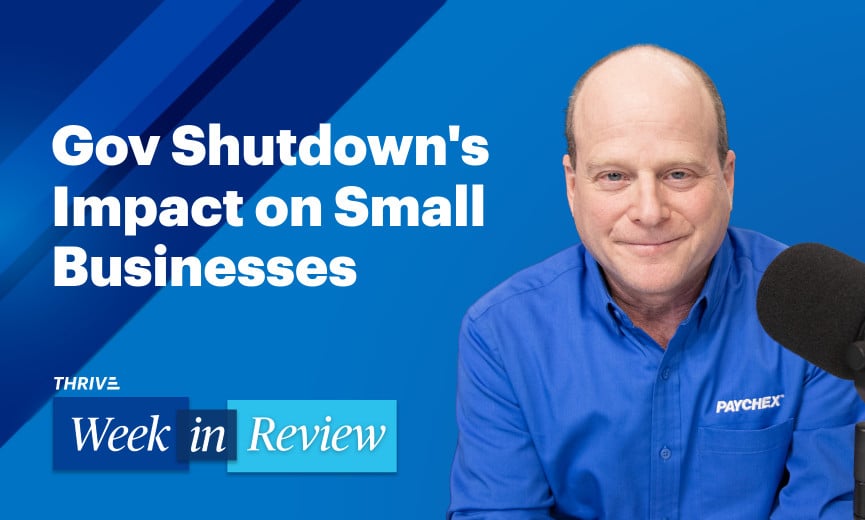- Thrive
-
Temporada
5Episodio46
El PIB, la inflación, los aranceles y los empleos complican las perspectivas económicas
Podcast •
Vea
Resumen
This week, Gene Marks breaks down the mixed signals in the economy, from promising GDP growth to rising inflation and unexpected job market revisions. Discover how tariffs are impacting prices and what it all means for small businesses. Plus, hear the good news on OSHA’s updated penalty reductions for compliant employers, offering a glimmer of relief. Get the insights you need to help your business manage all this uncertainty while staying optimistic about the future — listen now.
Ver transcripción
[Gene Marks, host]
Hey everybody, it's Gene Marks and welcome to this week's episode of the Paychex THRIVE Week in Review. This is where we take some headlines out of the news from the past week and talk a little bit about how they impact your small business and mine.
Well, this week was full of a lot of economic news. Some good, some not so good. I'm going to summarize a little bit. It was a nice report in USA Today that came out late last week. The encouraging news, gross domestic product grew 3% this last quarter, which is good news. A lot of it was generated by a trade, positive trade balance, and tariffs that were received, but a 3% growth in the economy in the last quarter is good. And also, consumers are happier. Both consumer confidence and sentiment continue to climb in July, recovering from their April lows that was, consumer spending is the largest part of the US economy.
Now, the not-so-great news, inflation was reported to be rising. The Fed's preferred inflation gauge, the Personal Consumption Expenditure Index, rose point 3% from May. Economist say the increase may be one of the early signs that tariffs are starting to push up prices.
And there was a surprise of job revisions. July's job gains were at 73,000 well below the expected 102,000. Unfortunately, there were many significant, about 258,000 jobs revised downwards from April and May, so the job market actually is not as strong as it has appeared.
On the same topic of the economy, there is the New York Times has reported that after a lag, businesses appear to be or being affected by tariffs or actually catching up with consumers right now, and also businesses as well. The New York Times reports there are growing signs that President Trump's levies are filtering through to consumer prices as companies exhaust options for keeping them stable. So, a lot of companies trying to absorb costs, but more and more companies, according to The New York Times, are passing through these costs to consumers, which is perhaps why we're starting to see a slight rise in inflation over the past month.
And also, to add to the job market disappointment that we had last week, there is a new survey that came out that said that 27% of U.S. companies plan to delay hiring or investment, so roughly one of four companies, this is according to the National Association for Business Economics. Underscoring concern about a murky outlook for the economy and the impact from shifts in trade and other policies by the Trump administration. Nearly three out of five business economists view recession as a top risk during the coming year, with the same proportion flagging changes in federal policy as one of the three potential hazards in coming months. 84% of respondents flagged a downturn as a leading risk.
So, the bottom line from all this news is that everybody's on edge, right? I mean, even though GDP rose significantly in the last quarter, a lot of it was due to additional tariffs collected and a trade imbalance, and some people thought because people were rushing in to get to buy and sell before a lot of tariffs took place. The inflation numbers came in higher. Job numbers were less than expected. Job additions during this month, and the 258,000 jobs revised downward, also not great as well. What does that mean for us as business owners? We have to be careful many of the industries that I talk to right now, while nobody is struggling or in very, very bad shape, other than real estate and construction are definitely having no challenges, most of the businesses that I'm speaking to in trade groups and associations around the country are battling away, still generating profits, still trying to deal with labor uncertainties and tariffs and sticky inflation as well, but they're muddling their way through it. Many businesses are trying to look forward with optimism to the coming months and years as things become more certain. Hopefully the tariff changes calm down a little bit, inflation becomes more predictable. Possible that the Fed could lower interest rates as well. And once inflation becomes more predictable, it's possibly that the Treasury market might become more predictable once Treasury yields might come down, which drives mortgage rates, and when mortgage rates come down, that could hopefully spur investment.
So the takeaway is this, as we are sitting here in August of 2025 we are what like seven months into the Trump administration, lot of changes coming from Washington, a lot of them that are having all sorts of effects throughout the economy, affecting both businesses, big and small, and we're just navigating around that turmoil right now until things become a little bit more certain. The economy is certainly not bottomed out, but it is showing signs of slowing down a little bit.
Finally, a little bit of good news for small businesses comes from OSHA, the U.S. Occupational Health and Safety Administration. This comes from a report by the law firm of Ogletree and Deacons. They announced that OSHA announced that it's reducing penalties for violations by small employers and those with clean safety records. OSHA also provided updated guidance on penalty and debt collection procedures. So, let me recap that. OSHA announced in the middle, just two weeks ago, that it is broadening the penalty reductions that small employers can qualify for. The new guidance also expands the penalty reductions for employers that have no history of repeated violations, and those that take steps to immediately correct a hazard. The new policies took effect immediately. So, even with all the uncertainty coming out of Washington and the tariffs and the economy, that is good news for a lot of small employers, OSHA is basically saying that if you are in violation of any of any you know safety rules, if you address them and you have no prior history, you can get now a reduction in their penalties. So that is good.
That is this week's Week in Review from Paychex and all the news that impacts your business. If you need any help or advice or tips in running your business, please sign up for our Paychex Thrive newsletter. Go to paychex.com/Thrive. My name is Gene Marks. I'll be back with you next week with more news that impacts both your business and mine, and a few thoughts on that news. Take care.
Do you have a topic or a guest you’d like to hear on THRIVE. Visit payx.me/thrivetopics and send us your ideas or matters of interest. Also, if your business is looking to simplify your HR, payroll, benefits or insurance services, see how Paychex can help. Visit the resource hub at paychex.com/worx. That’s W-O-R-X. Paychex can help manage those complexities while you focus on all the ways you want your business to thrive.
I'm your host, Gene Marks, and thanks for joining us.
This podcast is property of Paychex, Incorporated, 2025. All rights reserved.

 Apple Podcast
Apple Podcast Spotify
Spotify iHeartRadio
iHeartRadio









